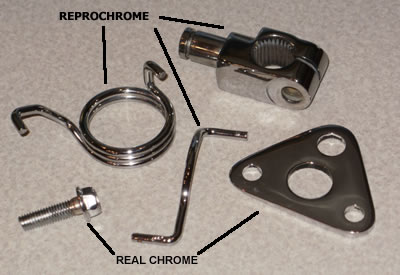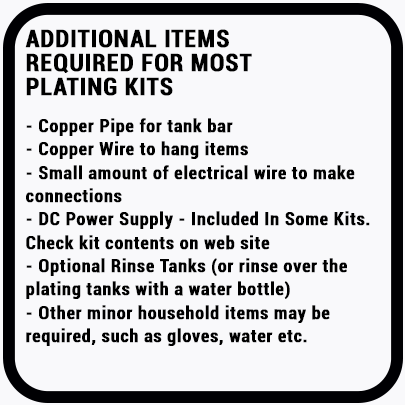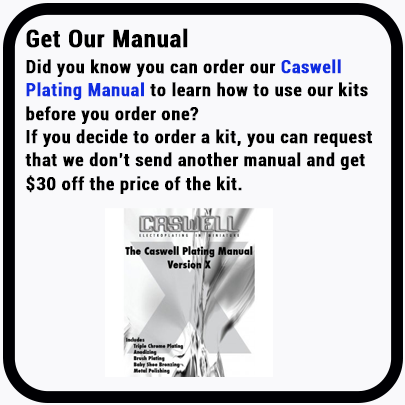Closed December 24-28 For Christmas Break
Reprochrome Chrome Plating Kits
The Look and Strength Of Real Chrome Without Environmental Issues or High Current Requirements
Introducing REPROCHROME®, a unique Cobalt/Tungsten alloy that contains no chrome, nickel or toxic materials. REPROCHROME® duplicates a chrome plate in color, durability and corrosion resistance, without the need for a fume control system or a high powered rectifier. Safer and easier to operate than a regular chrome plating system. REPROCHROME® is not EPA or OSHA regulated.

REPROCHROME® requires just 0.07 amps per square inch of part surface area to plate at approx 5V DC, instead of the 1-1.5 amps required of a regular chrome system, making plating larger parts a real possibility for small scale platers. REPROCHROME® has excellent throwing power and easily plates into recesses and low areas that regular chrome has trouble with. Get help choosing the right DC power supply here.
REPROCHROME® will plate directly over copper, brass, nickel and most ferrous and non-ferrous metals. However, for maximum shine and durability, we recommend using it in a Triple Plate system consisting of copper, nickel and REPROCHROME® plating steps.
The biggest requirement would be a DC power source, such as a plating rectifier. Because of the low amperage requirements of all these plating systems, even a smallish rectifier, such as our 25 amp model, will allow you to plate parts up to 2.5 sq ft in area (for example a valve cover) Get Help Working Out Part Surface Areas
You can also run the kits from a DC battery (car or motorcycle), battery charger, or other DC power source, provided you are comfortable building an amperage control device.
The typical steps to plate a steel part would be:
- Polish part to a high shine
- Degrease the part in the included degreaser
- Plate with Flash Copper
- Plate with Nickel
- Plate with REPROCHROME®
The included Caswell Plating Manual contains complete operating instructions for all systems, as well as extensive surface prep and restoration techniques.
The REPROCHROME® takes between 1-2 minutes to plate.
The REPROCHROME® system plates its metal from the REPROCHROME® solution. Additions of REPROCHROME® starter should be made periodically to replenish the metal and maintain uniform and consistent color. REPROCHROME® brightener additions should also be performed periodically at the rate of 0.4 fl oz per gal of starter (3ml per 1000ml)


